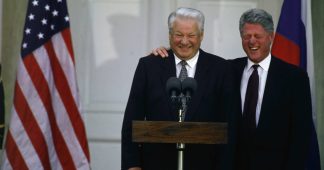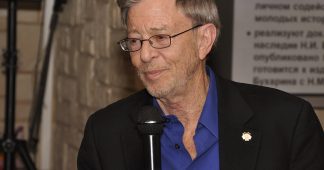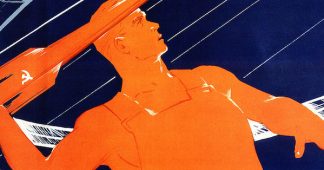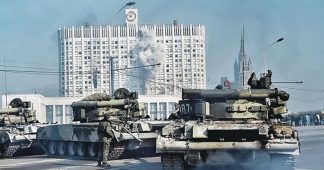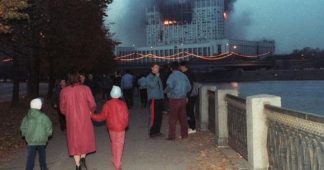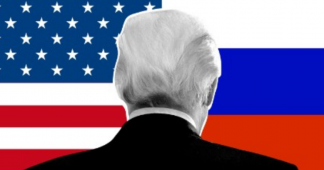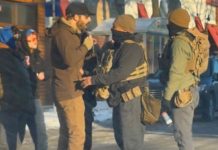By
AS THE POSSIBILITY of dictatorship looms yet again over Russia, the Yeltsin government is relentlessly imposing an epic spin on last week’s carnage in Moscow. Russia’s political winners have usually enforced their might-makes-right version of events as the nation’s official history, but this is the first time it has ever been echoed and endorsed by an American government.
According to President Boris Yeltsin, he had to order special military forces to attack the nation’s parliament with tank fire and arrest his two leading political rivals, Vice President Alexander Rutskoi and Speaker Ruslan Khasbulatov, because they had launched a “criminal mutiny” against Russia’s democracy. President Clinton says approvingly that “if such a thing happened in the United States,” he too would have taken “tough action.” But who actually began that “mutiny”?
In fact, on Sept. 21, Yeltsin dealt a wounding, possibly fatal, blow to Russia’s historic and exceedingly fragile democratization experiment by terminating parliament and all other elements of rule-of-law government in Moscow. He had tried but failed to do exactly the same thing on March 20. In the intervening months, respected Russian political observers, including members of his own entourage, warned that such a step would certainly lead to substantial violence, if only because many parliamentary deputies believed in their own democratic legitimacy and would resist. Knowing all this, Yeltsin nonetheless struck again, with the predictable outcome we have witnessed.
The Clinton administration, Yeltsin’s leading cheerleader in the West, therefore committed a grave misdeed by supporting Yeltsin’s actions so fully from the outset and justifying their fateful consequences now.
Russia’s democratization was begun by Mikhail Gorbachev, then Soviet leader, in the late 1980s, and grew into the first sustained attempt in the nation’s centuries-old history. By 1991, it led to the creation of fragmentary but essential components of a democratic system — a popularly elected parliament, president and vice president, an independent constitutional court and procurator, substantially free national media, and elected local legislatures.
By Sept. 21, Yeltsin had banned or suspended that parliament, vice president, court and procurator, shut down parliamentary publications, imposed self-serving censorship on nationwide television channels, threatened to disband local assemblies that did not fall in line, and brought armed security forces onto political center stage. In short, well before the parliament’s infuriated defenders recklessly tried to capture the television headquarters by force on Oct. 3, there was no longer democracy in Moscow, and it was in grave danger of crumbling elsewhere in the country in the aftermath.
Yeltsin justified all this, and won enthusiastic support from both the Clinton administration and virtually all of the U.S. media, by insisting that his coup against opponents would lead to greater democracy in Russia. Defending Yeltsin, two prominent American journalists, one a specialist on Russia, even tried to rehabilitate the infamous Stalinist adage, “You can’t make an omelette without breaking eggs.” But if 20th-century history, and especially Russia’s experience, teaches any lesson, surely it is that even a professed democratic end never justifies bad means, which produce only masses of broken eggs in the form of crushed hopes and lives.
Nor is it possible to be confident about Yeltsin’s promise of fair parliamentary and presidential elections in the near future. They would require, at the very least, that Yeltsin:
Retract his accusation that all of the parliament’s deputies who did not defect to him were part of a “bloodthirsty Communist-Fascist” conspiracy, an ominous echo of the trumped-up “Right-Trotskyist conspiracy” that fueled Stalin’s great terror of the 1930s.
Release his political opponents from prison.
Rescind his ban on opposition movements, including the Communists, the largest party in Russia (or perhaps Yeltsin is pondering the recent electoral comeback of Polish communists).
Stop other reprisals against his many adversaries and even mere critics across the country.
Completely and unconditionally end the new media bans he has imposed.
Give challengers fair access to national television, where nearly 90 percent of Russian voters get their information (something he refused to do in his April referendum campaign and in the confrontation with parliament).
Instruct the committee he appointed to write new electoral laws to make them equitable ones.
Reinstate the Constitutional Court so that there is some minimal guarantee of rule-of-law procedures in the electoral process.
Even if Yeltsin exhibits such political decorum, not a trait for which he has been known, what will he do if local legislatures and other regional authorities, which overwhelmingly opposed his Sept. 21 overthrow of the constitutional order, refuse to conduct new elections or comply with any of his decrees on their territories? It is a scenario for nuclear-laden Russia’s further disintegration and a civil war. The larger corps of military officers — those not drawn into the Moscow shootout — are already deeply divided politically. Local commanders, many of them full of loathing for the president and the entire four-year democratization experiment, may not remain so passive.
Indeed, now that Yeltsin has made the army and other security forces the arbiter of Russia’s political fate, how will he diminish their role to what it must be in any democratic system? Or, to take a special U.S. interest, will he reduce their already large role in Russian foreign policy? It was those forces, after all, that determined Eduard Shevardnadze’s crushing defeat in the former Soviet republic of Georgia — during the same week they were crushing the parliament in Moscow.
Why, then, was it necessary to put Russia’s fledgling democracy at such great risk? According to Yeltsin, the parliament, full of reactionary communists and fascist-like nationalists, has been the “hard-line” obstacle to all market and democratic reform and thus the cause of Russia’s deepening crisis since the Soviet breakup in 1991. The charge is ritualistically echoed in the American press, much of which repeatedly confuses this Russian parliament with its 1989 Soviet counterpart, and almost none of which bothers to study it carefully. Furthermore, even if the parliament was as bad as Yeltsin claimed, were his actions really better than simply waiting for its term to end by law in 1995? (Journalists may eventually uncover the real reasons why he acted so precipitously, even desperately, on Sept. 21.)
There is very little to admire in the legislature’s leadership, composition or recent behavior, but its real history and membership are much more complex. It is the same parliament, chosen in a generally acclaimed free election in 1990, that defied Gorbachev and the Soviet Communist party by making Yeltsin its first chairman. It is also the parliament that adopted a constitutional amendment enabling Yeltsin to become Russia’s popularly elected president in 1991, gave him sanctuary in its White House during the failed August 1991 coup, ratified his abolition of the Soviet Union in December of that year, and empowered him, for 12 months, to reform the economy by decree.
For reasons that remain unclear, and against the advice of Russia’s leading pro-market economists, Yeltsin opted for the policies known as “shock therapy.” By late 1992, these policies had impoverished the majority of Russian families, generated a Klondike “capitalist” profiteering in state goods and natural resources — “corruptalism,” as many Russians call it. They also shattered any popular consensus about the nation’s post-Communist future and thus eroded Yeltsin’s support in the parliament and political class generally.
As the social pain grew, extremists on both sides of an already raucous political spectrum became more zealous, undercutting centrists and inflaming legislative and executive branch leaders alike with contempt for any compromises. One of Russia’s eternal political questions, “What is to be done?,” gave way to another: “Who is guilty?” These deep-rooted realities, not the parliament or Soviet-era constitution, underlie the country’s crisis, and they will be reflected in any new, freely elected legislature.
But Yeltsin will have much to answer for in a court of history. As Russia’s first popularly chosen president, his highest duty was to exemplify and nurture liberal democratic practices, not just rhetoric, in a nation where support for them remains thin and where ancient demons of despotism still stalk the land. It was his special responsibility to lead a nation of citizens already tormented and torn by profound shocks — the loss of their country in 1991 and of their life savings and living standards in 1992 — toward social consensus and political compromise, not more pain and confrontation that only exacerbate Russia’s towering economic problems and arouse its anti-liberal, anti-Western, antisemitic specters.
Yeltsin’s apologists insist that he always sought compromise with the parliament, but consider the highly typical one he proposed this summer. Rejecting the parliament’s draft for a new separation-of-powers constitution, he demanded one whose legislature would either rubber-stamp the president’s laws or be subject to dissolution, and which abolished the office of vice president. Even his own handpicked “constitutional assembly” rejected it. In reality, well before provoking this latest and most dangerous polarization throughout the country, Yeltsin had reverted to Russia’s old czarist and Communist tradition of a “strong-hand” leader who exercises the “people’s will” against malevolent dissenting ideas, institutions, and rivals.
Striking down parliament was squarely in that leadership cult tradition, which has also played a very large role in Yeltsin’s electoral successes and on which he is still counting heavily. Six Russian or Soviet legislatures now have been disbanded in this century — four since 1917 in the name of a higher democracy. (Only Yeltsin has set one ablaze, generating a television image and cry that will be long remembered: Parliament is burning!) The twofold lesson is unmistakable and ought to be especially pondered by all those members of the U.S. Congress wildly applauding Yeltsin’s actions: No authentic democracy is possible anywhere, least of all in Russia, without a truly independent and fully sanctioned parliament or congress, no matter how disagreeable or unpopular it may become. And once abolished, such parliaments do not reappear easily or quickly in Russia.
Yeltsin’s Russian and American apologists will argue that none of these historical lessons matter. Let them explain, then, just a few of the many recent developments that collide with their spins and history-writing. The coup-makers who plotted against presidents Gorbachev and Yeltsin in August 1991 dared not order their tanks to fire on the Russian Parliament’s White House. Yeltsin did so. The two men who stood defiantly alongside Yeltsin against the 1991 putsch, Rutskoi and Khabulatov, now are in the infamous political prison Lefortovo, threatened with capital charges, while all the 1991 putschists remain untried and at liberty. And among the deputies still in the parliament on Oct. 4 was 33-year-old Oleg Rumyantsev, whose heroic efforts to write a truly democratic constitution for Russia — his draft was rejected by Yeltsin — led The Washington Post in 1990 to call him “the James Madison of Russia” and the U.S. National Endowment for Democracy to award his committee a grant and honor him as a featured speaker at its 1991 biannual conference.
As for the Clinton administration, it has lent America’s name to a strong-arm coup, encouraged the dissolution of a legislature that was supposed to ratify desperately needed nuclear disarmament treaties, further inflamed a growing backlash against our intrusive role in Russia’s internal affairs and contemptuously dismissed several parties and leaders with whom one day we, or our children, will have to deal. The administration replies that it was surprised by Yeltsin’s decision to shut down parliament and had to support him then and now as the best or only pro-democracy hope.
If Clinton and his advisers were really surprised, which Russia have they been observing since March 20, when with unflagging U.S. support Yeltsin first tried to abolish the parliament? Well before he struck again on Sept. 21, there was plenty of plain evidence that he intended to do so again.
Moreover, if the administration is right that Yeltsin is the only Russian leader fit to support or even properly acknowledge, on whom or what will it base U.S. policy if this 62-year-old man in dubious health suddenly leaves the scene? Above all, if the Clinton administration really believes that Yeltsin’s methods are the “best hope for democracy in Russia,” it is saying, in effect, there is no hope. That prophesy is false, but it is quickly becoming a self-fulfilling one.
Stephen Cohen is professor of politics and director of Russian studies at Princeton University. His books include “Rethinking the Soviet Experience: Politics and History Since 1917.”
Also read
